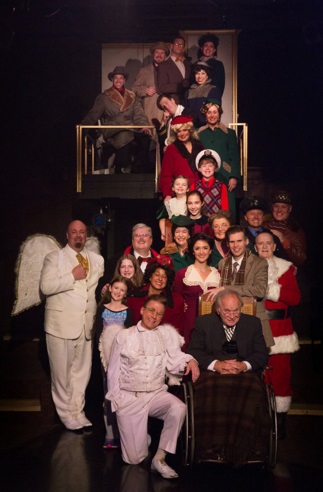If you’re gonna fly then you just gotta have wings! And the only way for Clarence Odbody, Angel Second Class, to earn his wings is by helping George Bailey hang onto God’s greatest gift! Acting veteran David James, well-known for his three decades of stage work in and around the Washington and Baltimore area, has returned to Toby’s Dinner Theatre of Columbia once more, a performance venue he’s proud to call home for the holidays, and is ready to earn his actor wings by sitting down for a TheatreBloom exclusive interview.
Merry Christmas, David! Thank you for joining us once again!
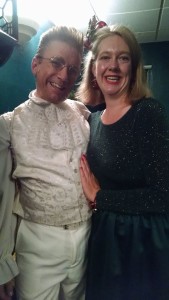
David James: Merry Christmas to you too, and to all your lovely readers!
Would you refresh our memories about where you’ve been and what you’re up to this time around?
David: Don’t you usually do this part for me? I can’t remember what show we’re in— wait— it’s Christmas! We must be doing It’s a Wonderful Life! And I’m back playing Clarence here. Let’s see, before that I played Henry Ford in Ragtime along with a bunch of other fun ensemble roles. I took the summer off, needed a little vacation, and just before that I was playing McNair in 1776, which we interviewed for, and way back at the beginning of the year I was Grandma Addams in The Addams Family, which we interviewed for as well. I think that covers the year. Well, Mary Poppins finished right after Christmas in 2015 but was carryover from last season, I was the servant boy, Robertson Aye. And they were all at Toby’s.
I understand this is not your first flight with Clarence Odbody, AS2. How did you find your way to this role?
David: It all started when I started working at Toby’s. The person who originated the role of Clarence in Toby’s production of It’s a Wonderful Life, whose name was Michael Bunce— who was followed in the role by Michael Carruthers— neither one of them were coming back to reprise the role the third time she mounted it in 1997, so I was asked to do the part. I want to say it opened in ’89 followed by a revival in ’91? That sounds about right.
So this is your second time taking to Clarence?
David: Actually it’s my fourth. Toby mounted it twice at Columbia, once in ’97 and then again a few years later in 2000. I did it both times at Columbia. And then it was mounted at the Toby’s of Baltimore venue ten years after I played my first Clarence, in 2007. So this here, not quite 20 years after taking over the role from Michael and Michael, I’m playing Clarence once more!
What is it like coming back and revisiting a role that you’ve played three times before? How are you making it different this time around? How are you keeping it fresh for yourself and for anyone who might recall your incarnations of Clarence from ’97, ’00, or ’07?
David: Well it definitely helps that we have new surroundings. There are two new people playing George Bailey and Mary Hatch. Wait— that’s not entirely true! Oh jeez, I don’t want people to think that angels lie. We just have really bad memories, at least this angel does. Matt (actor Matthew Schleigh, appearing courtesy of Actor’s Equity Association) did perform it with me back in Baltimore. So I’ve worked with him before. But it is a new Mary, Katie Keyser and she’s lovely. A couple of the ensemble people are new too. Is that it? It’s interesting because there are so many of them that I have worked with throughout. I actually think Robert (actor Robert Biedermann 125) who plays Mr. Potter has played that character in all of the productions I’ve done so far, including this one. And Lynne (actress Lynne Sigler) too. Lynne’s been Ma Bailey, George’s mother, every time I’ve done it too. Oh and Ma Hatch! Susan (actress Susan Thornton) is one of the originals, she’s played Ma Hatch every single time Toby has put It’s a Wonderful Life on her stage.
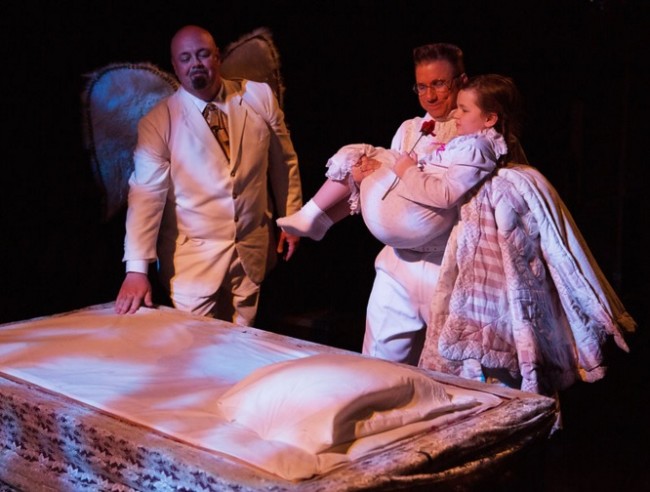
I think I realized I didn’t actually answer your question there. But new and different people, and actually the same people help keep it different for me too. We’re back in Columbia as well, which means back in the round. And that’s where it started but the last time I did it was in proscenium, so readjusting to the space is keeping me on my toes. I think it’s also the same thing I say to you every time we sit down for one of these, keeping a character alive on stage, whether it’s one I’ve played before or one I’ve played for the fourth time is about being present in every moment. I try very hard to make sure Clarence is present in every moment and actively paying attention to the scenes he’s watching, actively interacting with those scenes as much as he can, and really just living fully in each moment on stage.
Now, I will say having done it both here in the round and on the proscenium in Baltimore, I have to say I think this show does work so much better in the round. I think this show flows seamlessly in the round. You’ll see when you come to see the show, the way things turn into other things— I think you pointed out our flipping dinner table that becomes Zuzu’s bed— those things keep the story moving and are just suited for the round.
You mentioned that they had asked you to play Clarence once Michael and Michael were not to reprise the role, were you always interested in Clarence or were you just a part of the holiday show and that’s how the cards were dealt?
David: This was actually a big surprise for me the first time. I’d seen the movie before, we all have. So back in 1997 when they approached me about the role, and I was a bit younger then, I was really surprised. In the movie, Clarence is played by an older man, a much older man. Now it’s interesting because Toby (Artistic Director Toby Orenstein) has always done Clarence with a younger person. She likes showing Clarence George’s life with that wide-eyed enthusiasm of a young person.
How closely does this adaptation follow the movie? I think the biggest complaint I encounter at the holidays from people who mount any variation of It’s a Wonderful Life is that it’s too different from the movie.
David: Toby’s production is the closest stage version to the movie that there is out there. It’s much more on track with the storyline that unfolds in the movie. We have a Peter Bailey character, George’s father, just like the movie where all the other stage adaptations and radio plays leave him out. We do a lot of things just like the movie. Michael Tilford did the book and David Nehls did the music for it and like I said to you earlier, it’s very simplistic. It’s true storytelling. There’s nothing fancy or extravagant about this. The music does not get in the way of telling the story. I think a lot of people feel that way whenever a show gets turned from a non-musical into a musical.
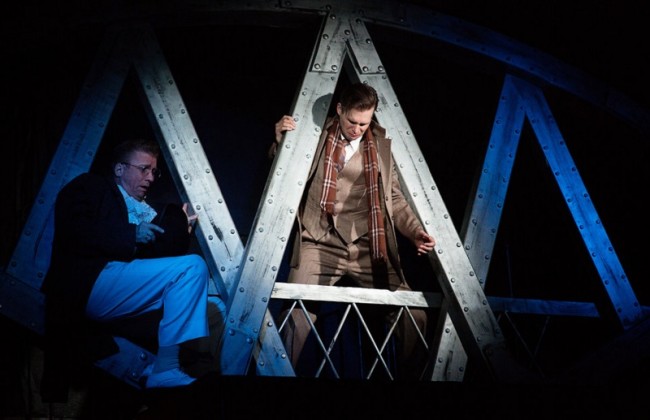
What does adding the element of music to this iconic show do for you? Does Clarence do a lot of singing and dancing?
David: Joseph (David Bosley-Reynolds) and I are interspersed through the entire show, basically providing commentary on what’s happening. It’s our job to advance the show and keep everything moving. We really don’t get to the core of it until Act II, and even then it’s the middle of Act II because Clarence doesn’t come down to earth to help George until then. Actually, now that I think of it, David doesn’t sing a single note in the show. He talks a lot but he never sings. I don’t have all that many songs either.
The songs I do get to do, hmm. I do a duet with Mary called “If Only I Could Reach Him.” In that number, Mary’s yearning and desperate to reach George, saying ‘if only she could reach him to show him what he means to this family.” And then I chime in. I say to Joseph, “I know that I can help him. I know that I can reach him.” Because up to that point I’ve been shown George Bailey’s life and I just know that I can help him out if I’m given the chance. The other song I get to sing is the fun number. “Ya Gotta Have Wings,” where I’m basically trying to convince George that I’m there to help him so that I can earn my wings.
Which one of those numbers is the dance number?
David: Wings. It’s like a vaudevillian number. I go all over the stage in that one. And there’s a big slide finish. It’s a fun number. Which reminds me— side note— and I have no idea why that triggered this thought all of the sudden, but back in 1989 when she first produced her own version of It’s a Wonderful Life? I was rooming with David Nehls at the time. We had a two-bedroom apartment and I was on one side and he was on the other side. I literally listened to him, through the air ducts, compose this music for Toby’s. It’s actually really neat I guess because years later I was performing what I heard my roommate at the time writing.
When you take on an iconic role such as this, because there are so many people that will recognize the character from the story and immediately think of Henry Travers who played him in the movie, what does that mean for you as far as what you end up performing in stage in regards to allowing the audience to identify with a character they love and recognize while still making him your own version of Clarence?
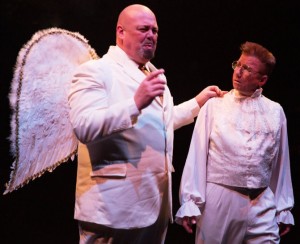
David: I think, because this production is borrowed so closely from the movie, the words are true to how Clarence would actually say them. It’s very easy to not disappoint the audience by straying. I still get to have fun with the role and I add all sorts of little things to keep it fun for me and for everyone while still keeping it within what people are looking for when it comes to Clarence. He’s just a younger version of what people are used to seeing in the movie. There’s actually a moment in the beginning where he says “…150 years and I still don’t have my wings…” obviously Clarence is always making mistakes and messing up. He is always trying. And here he is on this crucial night for George Bailey and he gets sent up to Joseph’s office because he’s the next one in line and Joseph even says, “Oh, it’s you again.” We have no idea how old Clarence really is.
He’s been trying, and failing miserably, but he knows this time he’s going to get it right. So I use that to my advantage. He’s been trying for 150 years but maybe he’s only 150 years old and in angel years that’s still very young. Joseph has a funny line about how if he doesn’t do it right this time it will be a very, very long time before he gets to try again because they do have an eternity to work with up there. So I think Clarence is still relatively young, which works well for me playing him and overall how I play him.
Do you feel like you can relate to Clarence? Or have some sort of personal connection to him?
David: Oh yeah. The world that we live in here in the theatre, we’re always striving to do the best we can. And all along the way we get knocked do
wn by either reviewers, or directors, or whoever, who are trying to push you in the right direction to make you the best that you can be. You’re always having to prove yourself in this industry. That you still have it, that you can still do it, that you’re still able to give it your all and then some. That’s what I believe it’s like for Clarence. He has to prove to himself that he can do this, so that he can prove to Joseph that he can do it and then actually win his wings. I’m trying every night that I’m on stage, regardless the show, regardless the role, to win my wings. No one goes out on stage trying to do a bad job. But the more you’re focused on stage, and the more you approach the show from the viewpoint of “this is the first time this audience has seen this show, let’s give them the freshest most energetic version that I can,” the more likely you are to win your wings!
Do you have a favorite quote of Clarence’s that makes it over from the movie to this stage adaptation?
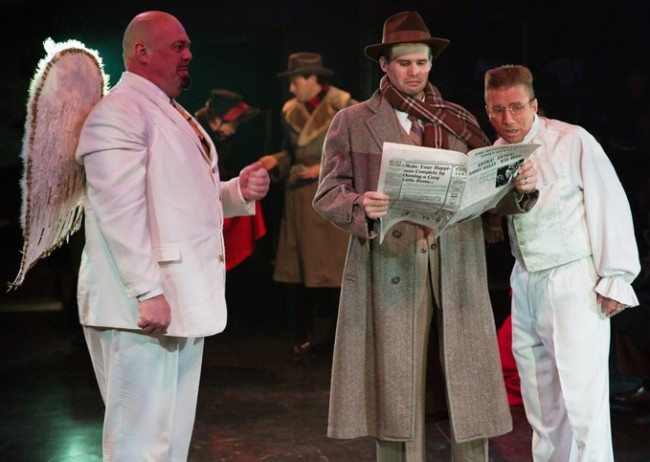
David: Actually my favorite thing that Clarence actually says from the film that has migrated into our performance is in the second act. It’s just after he’s gone to the cemetery and shown George Harry’s tombstone in the “if George were never born” world scenario. There’s that whole conversation where he tells George that “…every man on that transport died. Harry wasn’t there to save them because you weren’t there to save Harry.” It comes right after that and I say, “Strange isn’t it? How one man’s life can touch that of so many others.” And it’s true. We all go through life not knowing how many other lives we touch along the way. We have our relationships, we have our acquaintances, we have our friends, but we don’t really know how our lives have actually touched and changed people’s lives along the way. Especially in theatre, you have the ability to go out there and perform for someone and you don’t know when they leave, how it touched them, how it moved them, or what it meant to them.
You must like It’s a Wonderful Life to have done it four times now.
David: It is one of my favorite shows that she’s done. It’s an iconic piece. And it’s so simplistic. It’s just so honest. There are no gimmicks. Now, yes there are a few gimmicks in regards to how the set turns and all that, but those are logistical gimmicks of theatre that you’ll have with every show. I mean this is a show where it’s just honest story telling. You get that warm feeling from this show. Everybody’s been asking to see this show again.
Do you have an instance where you think you’ve earned your real life wings, David?
David: No, because I ultimately think that life is all about earning those wings. And this is not all about going to heaven or anything like that because I really don’t know what I believe when it comes time to thinking about me biting the dust. I think that your life is a work in progress, the ultimate goal is to earn your wings by the life lessons you learn and teach to others along your journey. I hope I’ve done good for people along the way, I hope that I have touched people’s lives along the way. As I get older, different things are very important to me. Things that were important to me when I was younger have no relevance to me whatsoever now. That’s not to say that they weren’t relevant to me at the time, but they’re just not important anymore.
My problem is that as you get older and things start to change, you start doubting yourself. Things are changing in everyone’s life all the time, it’s part of getting older, it’s part of going through life. I start doubting myself, I start questioning people. But ultimately, if people are supposed to be in your life they’re going to stay there. You do what you can to do the right thing and make life about earning your wings.
Do you have a moment in the show that defines the show for you?
David: Yep. This is going along with you just asking me have I personally done anything to earn my wings. And heads up, folks, this is a SPOILER. But towards the end, after I’ve done my final bit with George, I tell him where Mary is and he runs off. I actually get to hear George pleading on his knees, “I want to live again. I want to live again!” Then I snap him back into reality. It’s a very, very tender moment, and I know George can’t hear me because I’ve gone back into angel land, but I put my hand on his shoulder and I say, “Have a wonderful life, George.” To me, that moment says that it’s a continuation of his great life already and he’s going to go forth and continue to live that great life because he’s had this incredible gift of seeing what it’s like without him in the world.
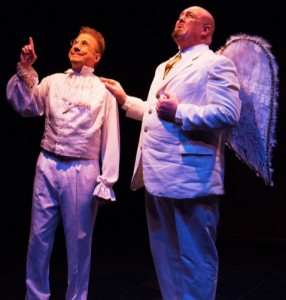
That shows Clarence’s maturity also. He’s a bumbling idiot when he first comes into the show, he’s just trying to do the right thing. But then he realizes that what he’s been able to show George something truly special. He’s been able to show George his life and all those people connected to him, and how many lives he really has touched, and what he really had. And now this is what he can go back to. That is a remarkable gift. It’s interesting when I say that line every night because my life is not an exemption from that. I don’t know whose life I’ve touched or how many people are glad that I’m still in their life.
Why do you think this is the ideal show for Christmas time?
David: It’s all about family. And yes, there’s a Santa Claus for two seconds at the end to help wish George a merry Christmas once he comes back to Bedford Falls, but it’s really about being with your family and the ones you love. It gives you that ooey-gooey feeling. Oh, don’t say that, that sounds horribly sentimental. But I guess that’s the point, isn’t it? This show puts all of us who have been hardened by our day to day life back in touch with our sentimental side for the holidays. It opens our hearts and reminds us to love our family, love our relationships, love our friends because you never know when it might be snatched away and you never know what kind of hole you’ll leave once you’re gone.
What has taking on Clarence for the fourth time now taught you about yourself?
David: Like I said before, it’s new surroundings. Back in Columbia after 15 years and in-between there was a proscenium show. New people to work against gives me more to play with and different things to play with. I get the privilege— well Joseph and I— we watch the show, the entire show, every single night. It’s interesting because you get to see growth of characters in a show that normally only people in the audience would get to see. This is every living minute of the show. And then I have to actively keep focused and jump in as a major player. It’s intense. David and I were talking about how we’re watching George’s story for the very first time. I think he can get away with a little less fascination in how he watches it because as Joseph he would have seen hundreds of thousands of stories just like George’s come across his desk. But here I am seeing it for the first time, I mean I can’t even see it because I don’t have my wings— don’t ask me why angels without wings can’t see the human world or what wings have to do with eyeballs— but here I am seeing this for the very first time, and the cast we have makes that a lot of fun for me to watch.
What has the show taught me about me? I know that was a little off just now, but it was important that it get said. Now, I know I’ve said this before about other shows that I’ve done. You lose the specialness of a show after the first time you do it because that first time is unique because it’s brand new and you’ve never done it before. This show, for some reason and I don’t know why, I really love doing. It’s rewarding in its own way every single night that I do it because I just love the piece so much. I love the fact that I still have an appreciation for doing theatre and presenting to the masses— or however may people show up on a given night— that I still have the urge to do it and enjoy doing it. This show has reaffirmed how much I love doing what I do.
What is it that you hope people will take away from seeing It’s a Wonderful Life at Toby’s?
David: Take time to reflect on your surroundings and those who are in your lives and what they mean to you. Bottom line.
Why should people come and see this show?
David: Because the spinach phunque on the buffet has never been better. Seriously though, why do people want to come and see anything? Hopefully it’s because they are going to enjoy the experience and get something out of the experience that they couldn’t get by staying home and watching Netflix. They should come enjoy an evening with their family. Spend time with your family, it is the holidays after all.
It’s a Wonderful Life: The Musical plays through January 10, 2016 at Toby’s the Dinner Theatre of Columbia— 5900 Symphony Woods Road in Columbia, MD. For tickets please call (301) 596-6161 or purchase them online.
To read the review of It’s a Wonderful Life: The Musical, click here.

